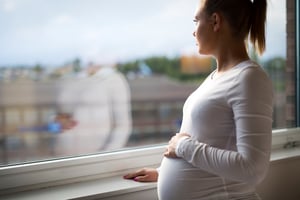PTSD, Depression May Increase Risk of Death in Women

Women with symptoms of posttraumatic stress disorder (PTSD) and depression are at an increased risk of death compared with women without trauma exposure or depression, according to a study in JAMA Network Open.
“Our findings are consistent with prior studies that found that co-occurring PTSD and depression are associated with worse health outcomes compared with either disorder alone,” wrote Andrea L. Roberts, Ph.D., of Harvard T.H. Chan School of Public Health and colleagues. For instance, previous studies show that people with PTSD are at an increased risk of chronic diseases, including cardiovascular disease and type 2 diabetes.
Although PTSD occurs at higher rates among women than men, most research examining the association between PTSD and increased risk of death have focused on men who are veterans, according to Roberts and colleagues. To examine the association between symptoms of PTSD, depression, and risk of death in women, the researchers analyzed data collected from participants in the Nurses’ Health Study II. This ongoing study involves 116,429 women who enrolled in 1989 at ages 25 to 42 years and are followed-up biennially.
In 2008, study participants aged 43 to 64 years were mailed a supplemental PTSD questionnaire, which asked whether they had ever experienced 15 potentially traumatic events (for example, a serious motor vehicle crash) and if so, which they considered to be the worst/most traumatic. They were then asked about PTSD symptoms in relation to this event (using the Short Screening Scale for DSM-IV PTSD) and past-week depressive symptoms (using the Center for Epidemiologic Studies Depression Scale-10, or CESD-10). The authors considered participants who reported six to seven symptoms of PTSD to have high PTSD symptoms; participants who scored 10 or above on the CESD-10 were considered to have probable depression.
Among 51,602 women (97% White) who completed the PTSD questionnaire in 2008, 2,093 women had high PTSD symptoms and probable depression, compared with 8,890 women with no trauma exposure and no depression. By 2017, 555 women in the study had died. The researchers found that women with high PTSD symptoms and probable depression were at nearly fourfold greater risk of death compared with women with no trauma exposure and no depression.
The researchers were able to obtain cause of death information for 109 deaths that occurred in women with any PTSD symptoms and probable depression and 124 deaths that occurred in women with no depression or PTSD. Compared with women with no PTSD or depression, women with PTSD symptoms and probable depression had higher rates of death from cardiovascular disease, diabetes, unintentional injury, suicide, and other causes of death. The rate of such deaths among women with PTSD and depression did not differ significantly compared with women with PTSD symptoms alone or probable depression alone, the researchers noted.
“Our findings additionally highlight the need for better access to and dissemination of effective treatments for comorbid PTSD and depression,” Roberts and colleagues wrote. “[T]reatment of PTSD and depression in women with symptoms of both disorders and efforts to improve their health behaviors may reduce this population’s increased risk of mortality.”
For related information, see the Psychiatric Research & Clinical Practice article “Psychobehavioral Responses, Post‐Traumatic Stress, and Depression in Pregnancy During the Early Phase of COVID‐19 Outbreak.”
(Image: iStock/fizkes)
Only a Few Days Remain to Submit New Research Posters for Annual Meeting
APA invites New Research poster submissions for the 2021 Annual Meeting. The deadline is Thursday, December 10, at 5 p.m. ET. The Scientific Program Committee encourages all submitters to keep in mind the Annual Meeting’s theme: “Finding Equity Through Advances in Mind and Brain in Unsettled Times.”
Don't miss out! To learn about newly posted articles in Psychiatric News, please sign up here.






